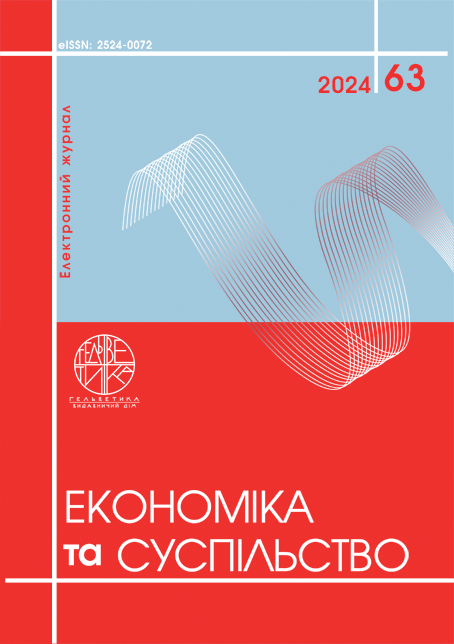ГАРМОНІЗАЦІЯ СХІДНОЇ ФІЛОСОФІЇ ФІНАНСІВ В АРХІТЕКТОНІЦІ СВІТОВОЇ ФІНАНСОВОЇ СИСТЕМИ
Анотація
Ісламська фінансова система, заснована на принципах східної філософії, пропонує унікальний підхід до управління економікою, що відрізняється від західних моделей. Ця система базується на моральних та етичних принципах, включаючи заборону на ріба (відсотки) та сприяння соціальній відповідальності, справедливості та співпраці. У статті досліджується вплив східної філософії на формування та розвиток ісламських фінансових інститутів, а також їх роль у глобальному економічному середовищі. Особлива увага приділяється аналізу ключових аспектів, таких як принципи спільного ризику та прибутку, механізми соціальної справедливості та прозорості, що дало змогу виявити, що інтеграція цих принципів сприяє створенню стійкої та гармонійної фінансової системи, яка відповідає потребам сучасного суспільства та підтримує економічну стабільність. У статті проаналізовано перспективи інкорпорування ісламської фінансової моделі в різних регіонах світу, підкреслюючи її потенціал для вирішення сучасних економічних викликів.
Посилання
Мозговий О.М., Юркевич О.М., Машина Ю.П. Особливості функціонування ринку капіталу в доктрині ісламських фінансів. Ефективна економіка. 2022. № 9.
Мозговий О.М., Юркевич О.М., Субочев О.В. Модель банківської діяльності в доктрині ісламських фінансів. Міжнародна економічна політика. 2022. № 2 (37). DOI: https://doi.org/10.33111/iep.2022.37.05
Юркевич О.М., Мозговий О.М. Аналіз моделей, заснованих на торгівлі в рамках ісламської економічної доктрини. Інвестиції: практика та досвід. 2022. № 4.
Ahmed H., & Turkistani A.Q. (2021) The Impact of COVID-19 on Islamic Finance. Journal of Islamic Accounting and Business Research, no. 12(3), pp. 361–378.
Ayub M. (2022) Integration of Islamic Financial Institutions in the Global Economy. Global Finance Journal, no. 29(3), pp. 301–318.
El-Tomi S. (2020) The Role of Islamic Finance in Developing Socially Oriented Economic Models. International Journal of Social Economics, no. 47(8), pp. 1055–1072.
Ernst & Young. (2022) Global Islamic Banking Competitiveness Report 2022-2023. EY Global.
Iqbal Z., & Mirakhor A. (2021) Economic Development and Islamic Finance. Islamic Economic Studies, no. 29(1), pp. 1–18.
Kammer A., Norat M., Pinon M., Prasad A., Towe C., Zeidane Z., & IMF Staff Team (2020) Islamic Finance: Opportunities, Challenges, and Policy Options. International Monetary Fund.
Khan M., & Bhatti M. I. (2022) Islamic Banking and Finance in the Post-COVID Era. Palgrave Macmillan.
KPMG (2022) The Future of Islamic Finance: Trends and Insights. KPMG International.
PwC (2021) The Growing Potential of Islamic Finance. PwC Middle East.
Saeed A. (2021) The Impact of Religious Principles on Economic Stability: An Analysis of Islamic Finance. Journal of Islamic Economics, no. 14(2), pp. 115–132.
Standard & Poor's (2022) Islamic Finance Outlook 2022. S&P Global Ratings.
Thomson Reuters (2021) State of the Global Islamic Economy Report 2021/22. Thomson Reuters.
World Bank (2022) Islamic Finance: A Catalyst for Shared Prosperity. World Bank Group.
Zoriana Lutsyshyn, Alina Vorobiova. Adaptability of the Islamic Financial System to Modern Technological Innovations. MIND JOURNAL. Semiannual. 11/2021. 115 p.
Z. Lutsyshyn, T. Frolova, O.Katrych, A. Vorobiova Islamic Finance in the Reconfiguration of the Global Financial System: a structural analysis and potential implications. // Under Ed. Z. Lutsyshyn. Bielsko-Biała, 2023. 190 р. URL: https://wseh.pl/en/publications/islamic-finance-reconfiguration-global-financial-system.html
Mozgovyi O. M., Yurkevich O. M., Mashyna Y. P. (2022) Features of the Functioning of the Capital Market in the Doctrine of Islamic Finance. Effective Economy, no. 9.
Mozgovyi O. M., Yurkevich O. M., Subochev O. V. (2022) Banking Activity Model in the Doctrine of Islamic Finance. International Economic Policy, no. 2(37). DOI: https://doi.org/10.33111/iep.2022.37.05
Yurkevich O. M., Mozgovyi O. M. (2022) Analysis of Trade-Based Models within the Framework of the Islamic Economic Doctrine. Investments: Practice and Experience, no. 4.
Ahmed H., & Turkistani A. Q. (2021) The Impact of COVID-19 on Islamic Finance. Journal of Islamic Accounting and Business Research, no. 12(3), pp. 361–378.
Ayub M. (2022) Integration of Islamic Financial Institutions in the Global Economy. Global Finance Journal, no. 29(3), pp. 301–318.
El-Tomi S. (2020) The Role of Islamic Finance in Developing Socially Oriented Economic Models. International Journal of Social Economics, no. 47(8), pp. 1055–1072.
Ernst & Young (2022) Global Islamic Banking Competitiveness Report 2022-2023. EY Global.
Iqbal Z., & Mirakhor A. (2021) Economic Development and Islamic Finance. Islamic Economic Studies, no. 29(1), pp. 1–18.
Kammer A., Norat M., Pinon M., Prasad A., Towe C., Zeidane Z., & IMF Staff Team (2020) Islamic Finance: Opportunities, Challenges, and Policy Options. International Monetary Fund.
Khan M., & Bhatti M. I. (2022) Islamic Banking and Finance in the Post-COVID Era. Palgrave Macmillan.
KPMG (2022) The Future of Islamic Finance: Trends and Insights. KPMG International.
PwC (2021) The Growing Potential of Islamic Finance. PwC Middle East.
Saeed A. (2021) The Impact of Religious Principles on Economic Stability: An Analysis of Islamic Finance. Journal of Islamic Economics, no. 14(2), pp. 115–132.
Standard & Poor's (2022) Islamic Finance Outlook 2022. S&P Global Ratings.
Thomson Reuters (2021) State of the Global Islamic Economy Report 2021/22. Thomson Reuters.
World Bank (2022) Islamic Finance: A Catalyst for Shared Prosperity. World Bank Group.
Zoriana Lutsyshyn, Alina Vorobiova. Adaptability of the Islamic Financial System to Modern Technological Innovations. MIND JOURNAL. Semiannual. 11/2021. 115 p.
Z. Lutsyshyn, T. Frolova, O.Katrych, A. Vorobiova Islamic Finance in the Reconfiguration of the Global Financial System: a structural analysis and potential implications. // Under Ed. Z. Lutsyshyn. Bielsko-Biała, 2023. 190 р. Available at: https://wseh.pl/en/publications/islamic-finance-reconfiguration-global-financial-system.html

Ця робота ліцензується відповідно до Creative Commons Attribution 4.0 International License.


